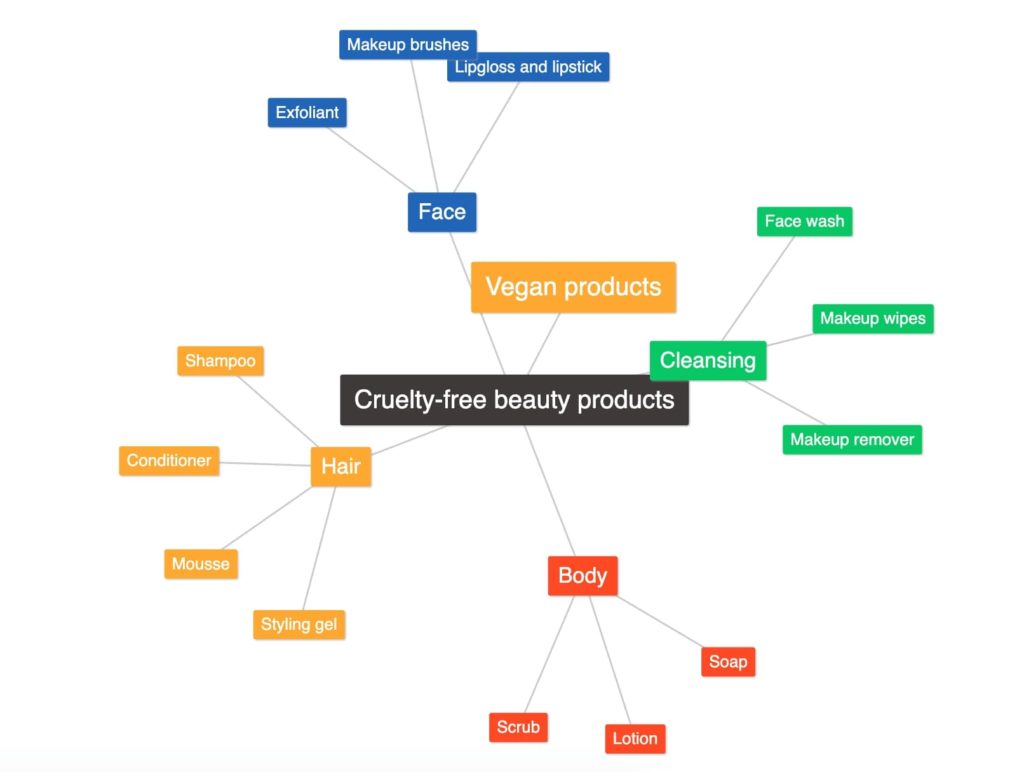
What is Niche Marketing?
Niche marketing is a targeted marketing plan that focuses on one particular section of the market that has high potential to connect with a specific product or service. The niche could be a demographic, a geographic area, a profession, or an interest area.
Unlike mass marketing, niche marketing is all about focusing on a small group of people or a market segment. You need to narrow your focus in niche marketing. Your target will be a small segment of consumers with unique and similar needs. Thus, you can define a niche market as a focused and targetable portion of a market.
For example, if you are a clothing retailer, your niche market could be “sustainable fashion for women over 40.”
This means, you business must address the need for product or service, which other mainstream providers failed to address. Now that you know what niche marketing is all about, it’s time to choose your niche. And for that, you need to opt for something you are knowledgeable about as well as something you enjoy doing.
How to choose your niche
The following are 3 elements that are essential for choosing your niche area:
- Make sure it is an area capable of delivering high profit
- Make sure the area has low risk
- Make sure you know your brand
Do the targeting and audience segmentation on the basis of Demographics (Age, Gender, Income, Education etc), Psychographics (Affinity, Preferences, Lifestyle, Spending habit, Browsing patterns etc) & Geographics (Location).
How to identify a niche market?
Learn about Maslow’s law (hierarchy of needs) and try to find out a high demand, high profit & low competition market. The research part is very crucial here.

Example of drilling down to a niche market
The following are the 5 big markets to niche down on.
- Health & Fitness
- Wealth / Money
- Relationships & Dating
- Self Improvement
- Hobbies, Interests & Activities
Now for example let’s take the health and fitness sector and select yoga. (Why? The Pilates & yoga market was valued at US$87,926 million in 2017 and is projected to reach US$215,811 million by 2025, growing at a CAGR of 11.7% from 2018 to 2025.)
So how you can further break it down to a specific niche?
- Yoga for students
- Yoga for over fifties
- Yoga clothing for men
- Yoga leggings for women

When it comes to high profit, opt for an area which is a ready market ‘just waiting for your’ product or services. Your customers must be ready (to pay) to purchase your products or leverage upon your services.
Regarding the area having low risks, this will eliminate the necessity to make large investments in your business. It must be an area where you can start with whatever you have at hand and get more tools as you move ahead.
Personal branding is extremely important in niche marketing. It plays an important role in positioning your business strategically in the market. The main focus would be on the exclusivity you are offering. This alone has the potential to attract your audience to your products or services.
Also, you need to be aware of what other people are talking about you, including your customers and target groups. For a successful personal branding you must stand out in the crowd, rather than being one amongst the many. You need to develop your mark, the same one that you have created around your name and career, into your business (products and services).
This will express and communicate your skills and values, making you unique for your customers and targeted audience. In fact, personal branding also helps when it comes to market yourself and your business to the world. This helps to create an impact and let you know what other people, including your customers, potential target and competitors, think about you.
Unfortunately, you will hardly have much control over this. The good news is you can influence over it, provided you ability and required knowledge to persuade your customers and target groups on social media.
Understanding Niche Markets
- Definition of Niche Markets: Niche markets are specific segments of the market that focus on addressing the needs and preferences of a narrow and specialized group of customers. These markets often have unique characteristics and requirements that differentiate them from the broader mass market.
- Characteristics of Niche Markets: Niche markets are characterized by their small size, targeted customer base, specialized needs, and limited competition. They often cater to specific demographics, interests, or industries.
- Benefits of Targeting Niche Markets: Targeting niche markets can offer several advantages, including:
- Reduced competition: Niche markets often have fewer competitors compared to the broader mass market, allowing businesses to stand out and establish themselves as experts in their field.
- Increased customer loyalty: By focusing on a specific audience, businesses can build deeper connections with their customers and create loyalty through personalized products or services.
- Higher profit margins: Niche markets often allow businesses to charge premium prices for specialized products or services, leading to higher profit margins.
- Improved marketing effectiveness: Marketing efforts can be more targeted and tailored to the specific needs and preferences of the niche market, resulting in higher conversion rates and return on investment.
- Reduced competition: Niche markets often have fewer competitors compared to the broader mass market, allowing businesses to stand out and establish themselves as experts in their field.
Selecting a Niche Market
- Market Research: Conduct thorough research to identify potential niche markets. Analyze market trends, customer demographics, needs, and preferences. Look for gaps or underserved areas where your products or services can provide value.
- Evaluate Size and Growth Potential: Assess the size and growth potential of the niche market. Consider factors such as market demand, competition, and market saturation. Ensure that the market is large enough to support your business goals.
- Identify Target Audience: Define your target audience within the niche market. Understand their characteristics, behaviors, and specific needs. Develop buyer personas to gain insight into their preferences and tailor your offerings accordingly.
- Analyze Competition: Evaluate the competition within the niche market. Identify existing players and understand their strengths, weaknesses, and market positioning. Differentiate your business by offering unique value propositions or addressing unmet needs.
- Assess Profitability: Consider the profitability potential of the niche market. Determine the pricing strategies and profit margins that can be achieved. Analyze the cost structure and ensure that it aligns with the revenue potential.
- Evaluate Resources and Expertise: Assess your resources, capabilities, and expertise to determine if they align with the requirements of the niche market. Consider factors such as product development, production, marketing, and customer support.
- Test and Validate: Before fully committing to a niche market, test and validate your offerings. Conduct market trials, surveys, or pilot programs to gather feedback from potential customers. Use this feedback to refine your products or services.
Strategic Approach to Niche Markets
- Differentiation Strategy [Unique Selling Proposition (USP)]: Differentiate your offerings from competitors by highlighting unique features, benefits, or value propositions that cater specifically to the needs of the niche market. Your USP is what differentiates you from your competitors. It should be something that your target customers value and that your competitors don’t offer. For instance, your USP could be “sustainable fashion made from recycled materials.”
- Personalization and Customization: Tailor your products or services to meet the specific needs and preferences of the niche market. Offer personalized experiences, customization options, or specialized support.
- Building Relationships: Focus on building strong relationships with customers within the niche market. Engage with them through personalized communication channels, provide excellent customer service, and encourage feedback.
- Continuous Learning and Adaptation: Stay updated with trends, changes, and evolving customer needs within the niche market. Continuously learn and adapt your offerings to ensure ongoing relevance and competitiveness.
By selecting the right niche market and employing a strategic approach, businesses can target specific customer segments effectively, differentiate themselves from competitors, and achieve sustainable growth and profitability.
4 Secrets for a Successful Niche Marketing Strategy

“Niche Market” refers to the specific demographic that you’re trying to reach. If you’re running a business, who are you trying to sell to? If you own a blog, who would you like to subscribe to it?
This all depends of course on your niche. Your niche is essentially the heart of what you do. If you could sum up everything your company website had to offer in two or three words, what would it be?
Throughout this guide we’ll discuss the 4 best ways you can target your niche market through the use of honest engagement and quality content.
Know Your Niche Market
Sounds simple enough right? Yet hundreds of companies, websites, and blogs have a poor idea of who their niche market really is. How do you expect to market to someone you don’t really know or understand?
Research and know where your niche market spends most of their time online. What websites do they visit besides your own? What is their preferred social media site? What are the top forums they follow?
Once you have an idea of what you’d like to offer your niche market, you’ll need to find out where they’re getting it already. I’d recommend trying out some bookmarking sites first. Reddit, StumbleUpon, Digg have very specific subset categories where you can locate just about any niche. Content is voted upon by their users so you always know what’s most popular for your given niche.
Find Your Competition
I use “competition” loosely because in many cases you’ll be collaborating with your competitors for some of your marketing campaigns. Basically you’ll need to research and discover the biggest online websites that already cater to your niche market’s needs.
Competition includes ecommerce sites, blog writers, forum moderators, Twitter accounts, Facebook groups, Pinterest boards, and pretty much anyone of any real importance in your niche. Again, although these specific sources are considered technically “competition”, in reality, you’ll be engaging them regularly to exchange resources that benefit them in exchange for niche market exposure.
For example, many mobile phone companies offer top tech bloggers their latest smartphones in exchange for a review article of the products on their blog. Some forums offer ad space on their site while bookmarking sites like Reddit offer promoted posts. After a while, some of your niche market reach might occur naturally.
An E commerce site sold some of their promotional products to a well known photographer. The photographer really loved what he got, and shared a picture of his new promotional jump drives on his Facebook account. With over 5,000 Facebook fans, that site got a ton of exposure from that single share. Later they reached out to other photographers and uncovered an entirely new niche market for their business!
Add Something New
Once you’ve researched where your niche market spends their time on the Internet and have a good idea what the biggest players in your niche provide, then it’s time to find out what’s missing. In other words, what makes you different than everybody else? What do you offer that I can’t already get elsewhere?
If a niche already has a ton of forums, blogs, and other written content, try producing some videos about it. If you’re a blogger, writing tons of well-written articles isn’t always going to cut it. Try offering an extensive eBook that’s the “definitive guide” to a subset of your niche.
If you’re running an ecommerce site, be the first to open a blog specific to what you sell. If most ecommerce sites in your niche already run a blog with short content, try writing some longer, more detailed articles that are more valuable. You’re basically still delivering your audience what they really want, but you’re differing in the way you present it.
If you’re targeting specific keywords in your niche for Search Engine Optimization, it’s a good idea to target some long tail keywords that expand on your topic.
For example, if everyone is targeting “movies” and “movie reviews” for their entertainment blogs, you could try targeting something like “1950s science fiction movie reviews” or “European movies” which expands on the topic and delivers something that isn’t regularly covered.
Try using the Google Keyword Tool or Google Trends to look into which topics and their subsets are currently popular for search engines.
Engage
Engage your competition. Engage your niche market. Engage your sub-niche communities. You’ve researched and found where the party’s at, now it’s time to get in there and mingle!
Leave comments on blogs, YouTube videos, and other posts. Participate in targeted forum discussions. Answer your fan’s questions through email and social media. Retweet and reply to tweets. Comment on Facebook. Regularly pin and repin on Pinterest. Write guest posts for targeted news sites and blogs. Conduct interviews of professionals in your niche.
If you engage every aspect of the Internet that your niche market occupies, then they’ll have no choice but to recognize you. It’s that simple.
Find out who you really want to target, find out where they hang out online, and then engage them there. All the while, don’t forget to offer something new and exciting to capture their attention when they visit your site. Niche marketing isn’t very complicated. It just takes a lot of dedication, and a lot of passion.
So what are you passionate about? What methods do you use to market your passion to an audience? Please share your experiences and questions in the comments below.
Steps to do successful niche marketing
Step 1. Understand the Gaps in the market.
Step 2. Research the Opportunity
Step 3. Create Your Marketing or buyer Persona.
Step 4. Brand and Value Proposition
Step 5. Content and Channels
Step 6. Develop a Content Strategy.
Step 7. Sales and Lead Generation by AACRO model.
- Activation
- Acquisition
- Conversion
- Retention
- Optimization
Step 8. Publish and Promote Your Content
Step 9. Identify Influencers
Step 10. Outreach
Step 11. Measure and Improve.
Effective Niche Market Segments
- Conscious consumers (Sustainability, Food & Health consciousness, Environmental consciousness)
- Pet owners
- LGBT Community
- Travellers
- Gamers
- Home Owners
- Remote workers
- Locals (Tap area specific problems & gaps in market)
Tools to use for niche marketing research
- Mind map (https://www.mindmeister.com/)
- Google trends
- Google Search
- Google Auto Suggestions
- Google PAA (People also ask feature)
- Google related searches
- Answerthepublic.com
- Ubersuggest keyword research
- Social listening / Social research tools
Examples of Mind map for finding a niche market:

Successful Niche Marketing Examples
10 companies who did successful niche marketing.
- Pabst Blue Ribbon
- Whole Foods
- Square
- Powell’s Books
- TaskRabbit
- Under Armour
- Casper and Purple
- Lefty’s San Francisco
- Vermont Wooden Toys
Here are some more examples of successful niche marketing :
- Conscious Consumers: Brands like Patagonia and Everlane focus on this niche market by promoting sustainability and ethical sourcing in their products.
- Health and Wellness: Companies like Gaiam target health-conscious individuals with their range of yoga and wellness products.
- Pet Owners: Brands like Chewy.com have found success by offering a wide variety of pet products, from food to toys.
- The LGBTQ+ Community: Brands like TomboyX offer inclusive underwear options for the LGBTQ+ community.
- Lefty’s San Francisco: This store specializes in products designed for left-handed people.
- The Middle Finger Project: This online platform focuses on empowering women to start their own businesses.
- Bonobos: An e-commerce-driven apparel company that designs men’s clothing.
- Whole Foods: They specialize in organic, non-GMO groceries, appealing to health-conscious consumers.
- Drybar: A salon chain specializing in blowouts, or hair blow-drying and styling.
- LUSH: Known for handmade and ethically-sourced cosmetics.
- Square: A financial services and digital payments company targeting small businesses.
- Powell’s Books: An independent bookstore in Portland, Oregon, catering to book lovers who prefer physical books over digital ones.
Each of these companies identified a specific niche market and tailored their products, services, and marketing efforts to meet the unique needs of these customers.
In conclusion, niche marketing is a powerful strategy for businesses looking to connect with a specific audience. By understanding your niche market and tailoring your marketing efforts to their needs, you can create a strong brand image and build a loyal customer base.








0 Comments